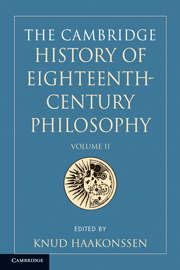31 - Natural History
from IV - Natural Philosophy
Published online by Cambridge University Press: 28 March 2008
Summary
Eighteenth-century natural history comprised a complex body of investigations that included local studies of botany and zoology, collection of natural artifacts, geographical and meteorological descriptions, geological study, landscape and gardening design, and other forms of inquiry conducted by an international group of practitioners. Deriving inspiration from the researches and speculations of Aristotle, Dioscorides, Theophrastus, Pliny, and Vergil in Antiquity, natural historians of the period could also draw upon important Renaissance transformations of the field inspired by such naturalists and herbalists as Otto Brunfels (1488–1534), Conrad Gesner (1516–65), Guillaume Rondelet (1507–66), Andrea Cesalpino (1519–1603), and Ulysses Aldrovandi (1522–1605) who created the tradition of ‘emblematic’ natural history. Institutionally, natural history developed in the seventeenth century in different forms of association with medical schools, in courts of the nobility, and in association with the new scientific academies inspired by the societies of London and Paris. Less elite forms of natural history were practiced by pharmacists, farmers, country clergy, and ‘local’ naturalists who created in the early modern period, particularly in the British Isles, the tradition of ‘chorographic’ natural history. This had originated in the works of William Lambarde and William Camden in the Elizabethan period and was developed by Gerard Boate and Joshua Childrey in the middle seventeenth century. It was exemplified for the early Enlightenment by Robert Plot’s The Natural History of Oxfordshire of 1677 (Oxford).
Each of these complex strands of development has a separable historical analysis and each feeds into the formation of eighteenth-century natural history. For the purposes of this chapter and this volume, the primary focus will be upon a select set of cognitive questions and will concentrate on an elite tradition of European naturalists, recognizing that a full understanding of the topic in this period requires analysis on several levels.
- Type
- Chapter
- Information
- The Cambridge History of Eighteenth-Century Philosophy , pp. 903 - 938Publisher: Cambridge University PressPrint publication year: 2000
References
- 4
- Cited by

